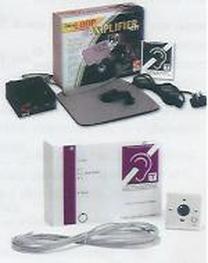Induction Loop Legislation
Heracles Ltd, Greater Manchester Nursecall systems, Induction loop systems are used to assist the hearing impaired by transmitting amplified sound, i.e., music, speech, etc, to NHS hearing aids. Demand for them is set to soar due to new legislation aimed at preventing discrimination against disabled people. This document provides a brief summary of all new and existing legislation/standards relating to induction loop systems and their installation.
BS8300 (2002)
British Standard BS8300 is the new code of practice for the design of new buildings and their approaches to meet the needs 0 disabled people. The standard states that "a hearing enhancement system, using induction loop, infra-red or radio transmission, should be installed in rooms and spaces used for meetings, lectures, classes, performances, spectator sports or films, and used at service and reception counters where the background noise level is high or where glazed screens are used" (9.3.2). It pinpoints the following areas for consideration: seated waiting areas; ticket sales and information points; fitness suites and exercise studios; churches; crematoria and cemetery chapels, educational, cultural and scientific buildings.
The Disability Discrimination Act (1995)
The aim of the Disability Discrimination Act (1995) is to stop discrimination against disabled people including the hearing impaired. The Act will be extended in September 2002 to cover education in schools and colleges and will be strengthened further in October 2004 as the Disability Rights Commission's (DRC) new Code of Practice comes into effect.
Service providers, i.e. companies or organisations offering goods, facilities and services to the general public, must make 'reasonable' adjustments to ensure that they do not unlawfully discriminate against disabled people. Employers must also take measures to ensure that existing and potential employees are not disadvantaged in the workplace.
Under the Act, 'reasonable adjustments' include the provision of various auxiliary aids, including temporary induction loop systems, to enable a deaf or hard of hearing person to access goods, facilities or services available to the general public. At present, service providers do not have to make any permanent adjustment to their buildings. This, however, is about to change.
From October 2004, service providers will be required to install permanent induction loops and infra-red systems where it is impossible or unreasonably difficult for a deaf or hard of hearing person to make use of a service. Service providers who fail to make adequate provision for people with hearing disabilities face prosecution. Furthermore, it is not enough to simply install an induction loop system - it must be properly maintained and staff must know how to use it. (DDA. Auxiliary aids and services 5.13) Some examples of service providers covered under the Act are:
Building regulations (1992)
Current building regulations state that newly erected or substantially reconstructed non-domestic buildings must provid aids for the hearing impaired. The aim is to enable both members of the public and employees to playa full part in conferences, committee meetings, etc.
Areas requiring cover include booking and ticket offices where the customer is separated from the vendor by a glazed screen, reception areas, auditoria and meeting rooms in excess of 100m'.
The regulations state that a person with a hearing disability must receive a signal some 20dB above that received by a person with normal hearing. The system should be able to suppress reverberation, audience or other environmental noise.
The Care Standards Act (2002)
On 1 April 2002, the Government's new Care Standards Act came into force. The new regulations demand that care homes provide certain adaptations and equipment for residents, specifically: 'facilities, including communication aids (e.g. an induction loop system), and signs to assist the needs of all service users, taking account of the needs, for example, of those with hearing impairment, visual impairment, dual sensory impairments, learning disabilities or dementia or other cognitive impairment, where necessary.' (standard 22.6). These are 'core requirements which will apply to all care homes providing accommodation and nursing or personal care for older people' in England. Regular inspections of homes and enforcement of the new legislation will be carried out by the new National Care Standards Commission.
Heracles Ltd, Greater Manchester Nursecall systems, Induction loop systems are used to assist the hearing impaired by transmitting amplified sound, i.e., music, speech, etc, to NHS hearing aids. Demand for them is set to soar due to new legislation aimed at preventing discrimination against disabled people. This document provides a brief summary of all new and existing legislation/standards relating to induction loop systems and their installation.
BS8300 (2002)
British Standard BS8300 is the new code of practice for the design of new buildings and their approaches to meet the needs 0 disabled people. The standard states that "a hearing enhancement system, using induction loop, infra-red or radio transmission, should be installed in rooms and spaces used for meetings, lectures, classes, performances, spectator sports or films, and used at service and reception counters where the background noise level is high or where glazed screens are used" (9.3.2). It pinpoints the following areas for consideration: seated waiting areas; ticket sales and information points; fitness suites and exercise studios; churches; crematoria and cemetery chapels, educational, cultural and scientific buildings.
The Disability Discrimination Act (1995)
The aim of the Disability Discrimination Act (1995) is to stop discrimination against disabled people including the hearing impaired. The Act will be extended in September 2002 to cover education in schools and colleges and will be strengthened further in October 2004 as the Disability Rights Commission's (DRC) new Code of Practice comes into effect.
Service providers, i.e. companies or organisations offering goods, facilities and services to the general public, must make 'reasonable' adjustments to ensure that they do not unlawfully discriminate against disabled people. Employers must also take measures to ensure that existing and potential employees are not disadvantaged in the workplace.
Under the Act, 'reasonable adjustments' include the provision of various auxiliary aids, including temporary induction loop systems, to enable a deaf or hard of hearing person to access goods, facilities or services available to the general public. At present, service providers do not have to make any permanent adjustment to their buildings. This, however, is about to change.
From October 2004, service providers will be required to install permanent induction loops and infra-red systems where it is impossible or unreasonably difficult for a deaf or hard of hearing person to make use of a service. Service providers who fail to make adequate provision for people with hearing disabilities face prosecution. Furthermore, it is not enough to simply install an induction loop system - it must be properly maintained and staff must know how to use it. (DDA. Auxiliary aids and services 5.13) Some examples of service providers covered under the Act are:
- Telecommunications and broadcasting organisations
- Public utility companies, such as gas, electricity and water suppliers - leisure centres, football stadia, national parks and health clubs
- Bus and railway stations, airports and travel agents
- Shops, hairdressers, post offices, banks and building societies
- Hotels, restaurants, cinemas, theatres and pubs
- Solicitors' offices, courts, churches and mosques
- The DRC advises service providers to take steps now to prepare for their extended obligations.
Building regulations (1992)
Current building regulations state that newly erected or substantially reconstructed non-domestic buildings must provid aids for the hearing impaired. The aim is to enable both members of the public and employees to playa full part in conferences, committee meetings, etc.
Areas requiring cover include booking and ticket offices where the customer is separated from the vendor by a glazed screen, reception areas, auditoria and meeting rooms in excess of 100m'.
The regulations state that a person with a hearing disability must receive a signal some 20dB above that received by a person with normal hearing. The system should be able to suppress reverberation, audience or other environmental noise.
The Care Standards Act (2002)
On 1 April 2002, the Government's new Care Standards Act came into force. The new regulations demand that care homes provide certain adaptations and equipment for residents, specifically: 'facilities, including communication aids (e.g. an induction loop system), and signs to assist the needs of all service users, taking account of the needs, for example, of those with hearing impairment, visual impairment, dual sensory impairments, learning disabilities or dementia or other cognitive impairment, where necessary.' (standard 22.6). These are 'core requirements which will apply to all care homes providing accommodation and nursing or personal care for older people' in England. Regular inspections of homes and enforcement of the new legislation will be carried out by the new National Care Standards Commission.
|
Meeting the Standards Induction Loop Equipment C-TEC manufacture a wide range of cost-effective induction loop amplifiers, many of which are available in kit format for ease of specification, purchase and installation, and all of which are fully compliant with the above standards. The PDA101C kit (pictured right), for example, includes everything required for a high quality counter loop system and is ideal for use in banks, building societies, post offices, ticket offices and any other area where limited coverage is required. The kit includes a PDA 101 induction loop amplifier, a small self-adhesive microphone, a loop indication sticker and a discreet easy to mount counter loop which generates a sound field of approximately one metre across. |
For installations up to 120m' in size, our new PDA200E wall-mounted induction loop amplifier is ideal. The unit includes straightforward internal screw connectors and pre-set internal controls, allowing the system to be set up in its entirety by any competent electrician. No less than eight PDA200E kits are available to help simplify installation in meeting rooms, lecture theatres, nursing homes, churches, schools, colleges, TV lounges, leisure centres, GP surgeries, hotels and shops. Our AKM1 meeting/seminar room kit is pictured right. Larger PDA range amplifiers are also available for more sophisticated applications. For example, the PDA 1 OOO/PDASOO has been designed to complement the high quality sound reinforcement systems found in theatres, conference systems, etc.

